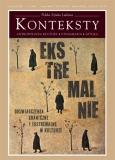Cierpienie. O doświadczeniu ostatecznym na Górze i na Pustyni Abraham – Mojżesz – Hiob – Mesjasz. Uwagi teologiczne i hermeneutyczne
On the Final Suffering on the Mountain Agraham - Moses - Job - Messiah
Author(s): Michał KlingerSubject(s): Anthropology
Published by: Instytut Sztuki Polskiej Akademii Nauk
Keywords: theology; Bible; mountain; suffering
Summary/Abstract: The covenant of God and man reveals itself on the Mountain and as an “ultimate” experience within the context of extreme suffering. It was underwent on the Mountain by Abraham, who, tempted by God, experienced the darkness of the faith and together with God attained “a vision”, thus becoming the father of a faith. This is the Mountain ascended by Moses in search of death, on which he remained “but no man knoweth of his sepulchre unto this day”. The author proposed an explanation of the mystery of this death. The “mountain” is the site of God’s great plan to destroy sinful mankind in a flood, after which the ark of hope reaches Ararat. Ancient Syrian tradition contains premises for acknowledging the tradition of “St. Job” as parallel to the Law of Moses. Apparently, the land of Ur is the site of man’s extreme drama, the scandal of the suffering of the innocent Job who within the hermeneutic of the Bible demands from God an equally borderline response. The mission of the suffering Messiah begins in the desert of temptation and reaches its pinnacle on the Mountain. The author suggested a method of interpreting the complicated Biblical texts as a “revelation” addressed to God and dealing with extreme and innocent suffering. The personae of these dramas integrate their personalities more fully. Nevertheless, the traditions of Judaism and Christianity, borrowing from Hellenism, tried different ways of “resolving” the problem of suffering by applying apocryphal addition or simply omission. Only contemporary theology and science about man (in particular psychoanalysis) restored to suffering its due rank of an “element” in the “Mendeleev table” of ultimate and human experience.
Journal: Konteksty
- Issue Year: 2014
- Issue No: 1
- Page Range: 86-97
- Page Count: 12
- Language: Polish
- Content File-PDF

